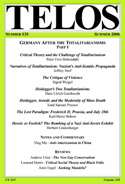On Tuesdays at TELOSscope, we reach back into the archives and highlight an article whose critical insights continue to illuminate our thinking and challenge our assumptions. Today, Andrew Walker looks at Peter Uwe Hohendahl’s “Critical Theory and the Challenge of Totalitarianism,” from Telos 135 (Summer 2006).
 Totalitarianism is a curious phenomenon of modern history and is often said to be a very twentieth-century one, at least as far as developed liberal democracies are concerned. The archetype totalitarian states in Nazi Germany and Fascist Italy defined their political order against the established liberal democratic systems that existed elsewhere in Europe, and we saw them off. Further backslapping was called for when the Soviet Empire disintegrated and democracy was able to spread throughout Eastern Europe. But, as should be expected with conceptual discussions such as these, it is not as simple as it first appears. Critical Theory in the Frankfurt School tradition began to reach maturity in the context of a totalitarian Europe; the analyses of social structures and processes within modernity are shaped by the Fascist or Soviet state. But the categories of critique developed at this stage of Critical Theory are not anachronistic curiosities. The term “totalitarian” is a tricky one to define and apply. Peter Uwe Hohendahl’s article “Critical Theory and the Challenge of Totalitarianism” is both a historical discussion of the development, but also of the wider applicability, of ideas and theories surrounding totalitarianism.
Totalitarianism is a curious phenomenon of modern history and is often said to be a very twentieth-century one, at least as far as developed liberal democracies are concerned. The archetype totalitarian states in Nazi Germany and Fascist Italy defined their political order against the established liberal democratic systems that existed elsewhere in Europe, and we saw them off. Further backslapping was called for when the Soviet Empire disintegrated and democracy was able to spread throughout Eastern Europe. But, as should be expected with conceptual discussions such as these, it is not as simple as it first appears. Critical Theory in the Frankfurt School tradition began to reach maturity in the context of a totalitarian Europe; the analyses of social structures and processes within modernity are shaped by the Fascist or Soviet state. But the categories of critique developed at this stage of Critical Theory are not anachronistic curiosities. The term “totalitarian” is a tricky one to define and apply. Peter Uwe Hohendahl’s article “Critical Theory and the Challenge of Totalitarianism” is both a historical discussion of the development, but also of the wider applicability, of ideas and theories surrounding totalitarianism.
Totalitarianism is not of itself an ideological position but involves total state authority with the goal of continuation of an established order. Herein lies the wider and present applicability of such a study:
it is crucial to understand that the totalitarian state is by all means compatible with a capitalist economy. The concept of a natural economic order (used by liberal theory to establish the notion of a free market) is shared but interpreted differently. For the fascist state, the advanced capitalist mode of production is useful as a way of employing the masses. What has changed, according to Marcuse, is the ideology used for the continuation of the existing economic order.
Later in the article, Hohendahl discusses the direction of the authoritarian state in post-World War II Critical Theory as the conclusion of state managed capitalism. The tendency, in this argument, is toward a rationalized economic sphere that dominates irrational social processes and structures.
The goal of this critical tradition is not to set state-socialism against liberal democracy, nor the reverse, as the model of freedom and human happiness. The goal, Hohendahl claims, “is that of a non-antagonistic democracy.” This line of thought is not exclusively drawn from direct analyses of what it is to be totalitarian. The discussion of modernity and post-Enlightenment rationality is inseparable from discourse on the authoritarian state. The idea within early Critical Theory that “[t]he very rationality that enables humans to overcome the fatality of myth also contains the regression to mythic unfreedom” leads to the conclusion that “the methodology of the Enlightenment is already proto-totalitarian.” Hohendahl continues: “for Horkheimer and Adorno the expansion of modern mass culture serves as an index for the decline of individual freedom and the potential rise of the all-embracing total state.” Such a development undoubtedly subverts the democratic element within modern mass democracies.
It is the critique of the bureaucratization of modern states that allows Critical Theory to analyze them in terms such as “authoritarian” and “totalitarian.” According to Hohendahl, it is in the formation of this as a historical-philosophical critique that gives it more weight: it allows the observer to
shift the emphasis from the political enemy, the totalitarian regime, to a more profound danger residing in the formation of the human subject in its alienation from nature. Differently put, the political critique has turned into a philosophical critique for which National Socialism and Stalinism provide the horrifying examples.
If the goal of the non-antagonistic society is to be envisioned at all, a process of society wide critical self-reflection must occur which can focus on qualitative change within social organization. Late capitalism is characterized by a lack of qualitatively focused self-analysis; it is “like a machine on autopilot.” In cases where such societies begin to malfunction, states have to resort to more and more overt authoritarian means to maintain order.
Read the full version of Peter Uwe Hohendahl’s “Critical Theory and the Challenge of Totalitarianism” at the TELOS Online website. If you are affiliated with an institution that is an online subscriber to Telos, you have free access to our complete online archive. If not, you can purchase 24-hour access to this and other Telos articles at the low rate of $5/article.








